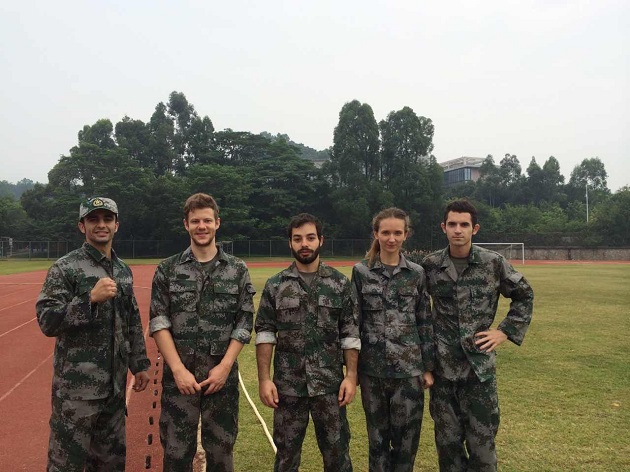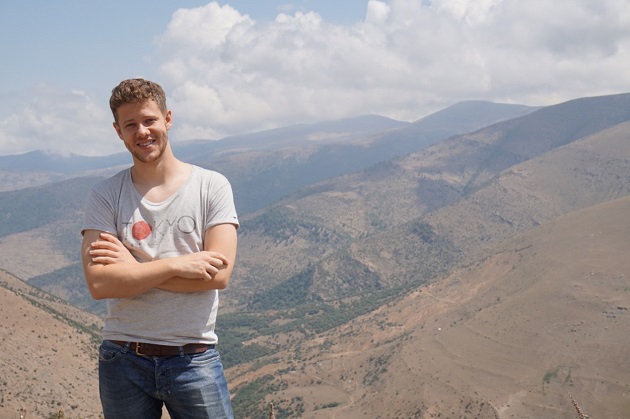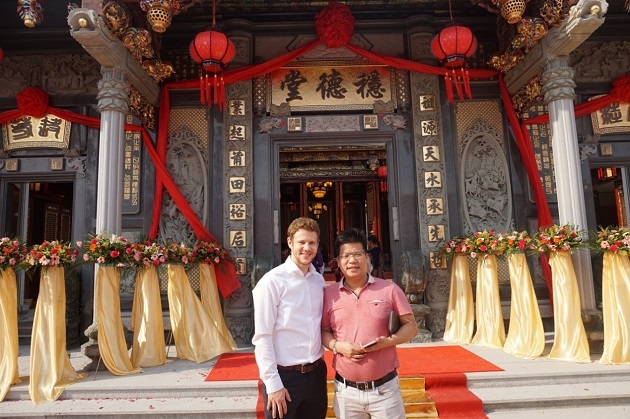This is the third in a series introducing some of the international students at Peking University HSBC Business School.
Sebastian Preißner, from Würzburg Germany, is a first-year quantitative finance student at Peking University HSBC Business School (PHBS). With a bachelor’s degree in business administration from the University of Applied Sciences Würzburg-Schweinfurt, Sebastian said his decision to pursue a master’s degree in China was “not a random decision but more a gradual process over several years.”
A glance at Preißner’s CV reveals his initial interest in China began in high school when he participated in a pilot project for learning Chinese. This fueled his curiosity about Chinese culture and led to an exchange program at Jiangxi University of Finance and Economics. Yet, Preißner said that his experience as an exchange student is totally different than being a full-time graduate student at PHBS. As an exchange student he lived in a bubble of international students with limited contact with the real China and China’s education system. He said that six months after the exchange program, he took an internship at EAC, a consulting firm in Germany focusing on BRIC countries (Brazil, Russian, India, and China) and growth markets. There, he did a lot of research on the Chinese market and contributed to a business report entitled Impulse:
Implications of Chinese Competition Strategies for German Machine Manufacturers.
Preißner on the opening ceremony of his friend’s business in Guangzhou
Preißner said that his growing exposure to China together with his knowledge about Chinese culture has become a “diversification strategy”in contrast to other German students who plan to they plan to return home to look for jobs in Germany. “Just think out of the box”, said Preißner, stressing that it is important to differentiate yourself in a competitive world. And he has been trying to do so all the time.
Preißner finds that studying at PHBS gives him a platform on which he can excel academically while experiencing Chinese culture and meeting students from other countries. Like most international students, he has to challenge himself to keep up with the Chinese educational system’s focus on quantitative courses. However, he is auditing three additional courses in addition to the three required courses per module. Preißner said that he most enjoys Professor Gang Fan’s course, “Theory and Practice of Socialist Economics: Economics of Development.” said Preißner, “Looking at China and China’s economy with a Westerner’s mindset or lens sometimes puzzles me and leaves me with a lot of contradictions. But, Professor Gang Fan offered some ideas and alternative perspective of looking at China which brought light into the dark.”

Preißner with his classmates having military training on each Wednesday morning. From left to right, they are Mahmoud Berrajaa from Morocco, Sebastian Preißner from Germany, Sergey Kocharyan from Armenia, Anastasia Qiu from Russia, and Karras Lambert from the United States.
Besides his academic commitment,Preißner takes part in the PHBS military-type fitness and team-building training every Wednesday morning. Required of the first-year Chinese PHBS students, the collective exercises are open to international students if they wish to participate. In November, Preißner also took part in the PKU Shenzhen Games and along with his 20-member team won the tug-of-war. Further, his football team won the freshman football tournament. In addition to athletic pursuits, Preißner is active in several student associations including the Student Union, International Business Association, and Business Mode Association.
It is inevitable that people encounter culture shock when living in a culture different from their own. Preißner shared his not-so-successful experience when he tried to organize a tea culture seminar for international students at the Dafen Oil Painting Village, practically an “art factory” where there are also numerous private art exhibitions. It is in Buji Subdistrict of Shenzhen. “It’s difficult to negotiate a fair price with the owner of a private gallery”, said Preißner, “and the way that people do business here is totally different than back home.”He thinks that Chinese businessmen “leave more room for negotiation,” and prices settle on bargaining power. He acknowledged that he needed to learn more about business negotiation in a different culture.
 This picture was taken in Iran when Preißner interned at the stock exchange, which he regards as his most enriching personal experience.
This picture was taken in Iran when Preißner interned at the stock exchange, which he regards as his most enriching personal experience.
When asked about future plans, Preißner said that in the short run he would go back to Germany and enter his parents’ family businessafter graduation. In the long run he expects his studying experience at PHBS will enable him to establish some connections with the Chinese market.
By Jessie Su
Edited by Young and Jin











